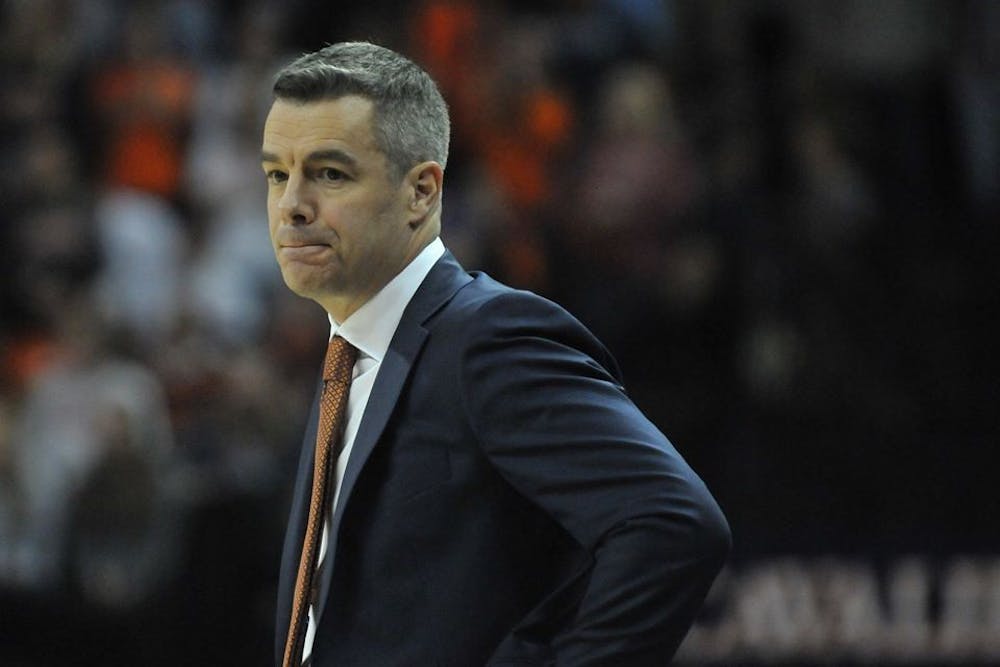Virginia men’s basketball started the season unranked, ending a string of 63-consecutive weeks in the AP Top 25. The national narrative was that Virginia had lost too much talent to graduation and transfers, including both of last season’s leading scorers in London Perrantes and Marial Shayok.
Additionally, the last time the Cavaliers played, they put up a 39-point dud against Florida in the NCAA Tournament, casting doubt over whether Coach Tony Bennett’s unique style could succeed in March.
Correspondingly, the media had little faith in the Cavaliers to start the season. CBS Sports didn’t even name them as the best team in the state of Virginia, ranking rival Virginia Tech ahead of them.
The national media weren’t the only ones to insult Virginia either, as recruits seemed unreceptive to Bennett’s program, despite — or perhaps in light of — recent graduate Malcolm Brogdon’s professional success.
Even with five scholarships available, Bennett was only able to get commitments from forward Kody Stattman and guard Kihei Clark, a class that ranks 136th nationally and 13th in the ACC, according to 247sports. The only team below Virginia in the ACC is Louisville, which is mired in a FBI scandal.
However, the results on the court to date couldn’t be more different from this relatively dismal picture.
Regardless of what any individual media member suggests, Virginia is quite good. They’re ranked No. 2 in the AP Poll, and third in KenPom. The Cavaliers’ 81.6 defensive rating is the lowest in KenPom’s history, which dates back to 2002.
And despite poor recruiting this year, this roster is arguably the most talented Bennett has ever coached. Bennett’s seventh-ranked 2016 class, featuring sophomore guards Kyle Guy and Ty Jerome as well as redshirt freshman guard De’Andre Hunter, was his highest ever, and is coming of age. This young nucleus is complemented by strong and seasoned upperclassmen, led by senior guard Devon Hall and senior forward Isaiah Wilkins.
Thus, there are two pictures being simultaneously painted of Virginia basketball. One is of a team that is outclassed athletically and offensively, fueled by pace-of-play gimmicks in the regular season that can never hold up in March. Another, however, is of a national powerhouse program still on the rise, run the way college basketball purists have always advocated — player development, discipline and defense — and while March success has yet to come, it can’t be far off.
Virginia fans — and anyone who follows the sport — are stuck in a tug of war between these two images. While the recruiting trail and pre-season conversation pointed towards the first description, all the evidence on the court has pointed towards the latter.
This on-court evidence is nothing new, however. It has supported Virginia for a while — over the past five seasons, Kentucky and Arizona are the only Power 5 conference schools with better records — suggesting that this season’s success won’t be enough to change the narrative.
Even after defeating then-No. 12 North Carolina 61-49, the national coverage barely shifted in tone.
While Tar Heel Coach Roy Williams described the game as a “big ole butt kicking.” The USA Today recap of the game led off by saying that “If there was an award for winning with the least amount of talent over the last five seasons, Virginia coach Tony Bennett would take it by a landslide.”
It’s this sentiment that frustrates Virginia faithful — that no matter how many blue bloods Virginia topples, nor how consistently they do so, their wins are discounted as the result of some sort of system. The media rarely allow for the possibility that the Cavaliers simply outplayed their opponents — the baseline assumption for any other team.
If five seasons of on-court success aren’t enough, then how can Bennett buck the perception that his teams don’t belong among the nation’s elite?
Virginia will likely never compete for the five star players that lend teams instant gravitas, since it won’t promise early playing time or a quick route to the NBA. However, this year’s team shows that the ceiling is higher when the talent on the roster is better.
Virginia is not a program devoid of ACC caliber talent, nor is it agnostic to the quality of the players on the roster, even if Bennett often finds diamonds in the rough when it comes to recruiting.
The only other surefire avenue to achieve national respect is to find success in March, something that eluded the Bennett teams of the Brogdon and Justin Anderson era. While every program loses some in March — Duke has fallen in the first round to 14 and 15 seeds in the past five years — overcoming that hurdle may ultimately be the only way to earn national respect.
This year’s team can compete with any team in the country — full stop. Here’s hoping they find a way to help the rest of the country see that.
Jake Blank is a Sports Editor and Columnist for The Cavalier Daily. He can be reached at j.blank@cavalierdaily.com or on Twitter at @Jake_33.







